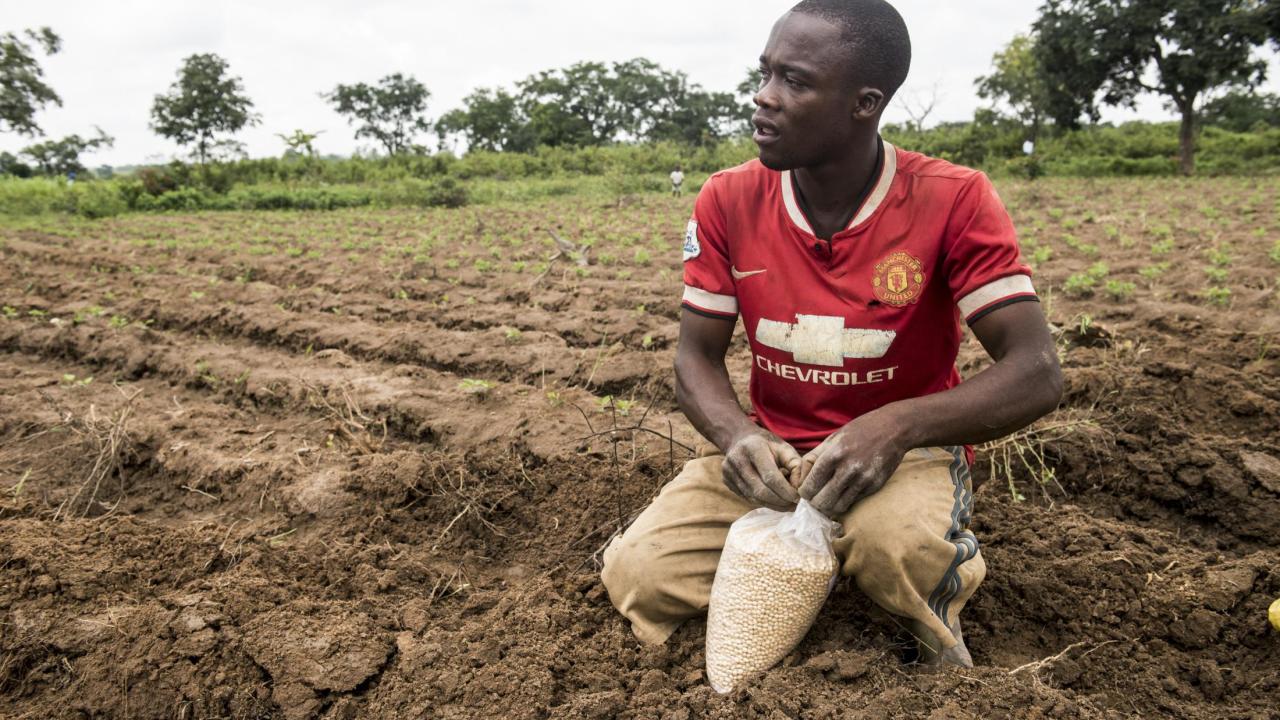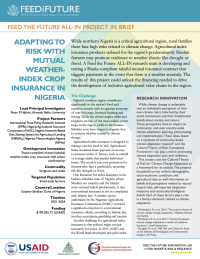
While northern Nigeria is a critical agricultural region, rural families there face high risks related to climate change. Agricultural index insurance products tailored for the region’s predominantly Muslim farmers may promote resilience to weather shocks like drought or flood. A Feed the Future ALL-IN research team is developing and testing a Sharia-compliant takaful mutual insurance contract that triggers payments in the event that there is a weather anomaly. The results of this project could unlock the financing needed to drive the development of inclusive agricultural value chains in the region.
Project Overview
Lead Principal Investigator: Peter P. Njiforti, Ahmadu Bello University
Project Partners: International Food Policy Research Institute (IFPRI), Nigeria Agricultural Insurance Corporation (NAIC), Nigeria Incentive-Based Risk Sharing System for Agricultural Lending (NIRSAL), Nigerian Meteorological Agency (NiMet)
Development Innovation: Sharia-compliant mutual (takaful) weather-index crop insurance with photo confirmation
Commodity: Sorghum and millet
Targeted Population: Small-scale farmers
Country/Location: Sudano-Sahelian Zone of Nigeria
Timeline: 2021-2024
Funding: $272,299 (USAID)
The Challenge
Nigeria’s northern region contributes significantly to the nation’s food and nutrition security with its agrarian economy of rain-fed crops, livestock farming and fishing. While the critical staples millet and sorghum are two of the most widely grown crops in the region, yields in the Sudano-Sahelian zone have begun to stagnate due to extreme weather caused by climate change.[1]
Agricultural index insurance is designed to manage just this kind of risk. Agricultural index insurance bases payouts on an easy-to-measure index of factors, such as rainfall or average yields, that predict individual losses. The result is low-cost protection for farmers who face a predictable, recurring risk like drought or flood.
One limitation for index insurance in the Sudano-Sahelian zone of Nigeria, where Muslims are majority and the Islamic socio-cultural beliefs predominate, is that conventional insurance is not in compliance with Islamic law.[2] A market survey undertaken by the Nigerian Agricultural Insurance Commission (NAIC)[3] revealed a significant objection to conventional insurance, which, according to Islamic law, involves uncertainty, gambling and interest.
Another challenge for agricultural index insurance is that policies might not pay accurately for losses. In 2011, NAIC and the World Bank developed two pilot index insurance contracts for rice and maize in northern Nigeria based on measures of rainfall. An analysis showed that these contracts would not pay reliably for farmers’ losses in part because of the nature of rainfall conditions in the region.

Research Design
An ALL-IN research team led from Ahmadu Bello University is testing whether a takaful weather index insurance and a picture-based insurance audit can increase rural families’ resilience to extreme weather events in the Sudano-Sahelian zones of Nigeria. Weather stations in the region create a ready source for rainfall and temperature data to build and test randomized variations of the team’s new weather index insurance contracts.
The project is being implemented as a randomized controlled trial (RCT) in 50 rural communities that are divided into three groups:
- Weather index-based insurance: Farmers receive standard weather index insurance that triggers payments for losses in the case of abnormal temperature or unseasonal rains during flowering and harvest time in the area.
- Mutual (Takaful) insurance plus financial literacy training: The Sharia-compliant takaful index-based insurance product is complemented with training on the benefits of insurance as well as the concept of takaful insurance. Farmers regularly upload smartphone pictures that extension experts inspect for crop damage due to risks beyond farmers’ control before payouts are issued.
- Control: Farmers receive no insurance or training
The project includes farmers who own smartphones and plan to grow at least two hectares of maize during the upcoming rainy season in eight states across Northern Nigeria. Farmers are selected according to a variety of stratifications to ensure different types of typical farmers are included. Farmers who receive either conventional or takaful insurance are provided coverage for up to one hectare of sorghum or millet. The cost of the insurance is paid entirely by the project’s NAIC and Nigerian Incentive-Based Risk Sharing System for Agricultural Lending (NIRSAL) research partners.
The study is measuring outcomes in a number of areas. One is an estimate of how a mutual weather index insurance scheme that is compliant with the Islamic principle of Takaful affects the demand and use of weather index-based insurance. The study is also evaluating the impact of uptake and use of mutual (takaful) weather index insurance on farmers’ investments in enhancing productivity and yields as well as whether this type of scheme paired with information on weather risk reduces the likelihood the insurance product fails to pay accurately for losses.
Development Impact
Key USAID priorities in Nigeria are in agriculture and food security. This research project will complement and strengthen activities related to agriculture and food security which, since 2012, have helped to increase agricultural productivity, expand market participation, increase the resilience of vulnerable households, improve the business enabling environment and increase access to finance.
Results from this project will also enable NAIC and NIRSAL to meet their goal of expanding insurance to Nigeria’s roughly 15 million smallholder farmers. These efforts could ultimately unlock the needed financing to drive the development of inclusive agricultural value chains in the region.
[1] Rhodes, E. R., et al. 2019. “Climate change impact chain factors in ECOWAS.” Journal of Agriculture and Environment for International Development.
[2] Swartz, P., et al. 2010. “Takaful: An Islamic insurance instrument.” Journal of Development and Agricultural Economics.
[3] NAIC, 2013.
This report is made possible by the generous support of the American people through the United States Agency for International Development (USAID) cooperative agreement 7200AA19LE00004. The contents are the responsibility of the Feed the Future Innovation Lab for Markets, Risk and Resilience and do not necessarily reflect the views of USAID or the United States Government.
